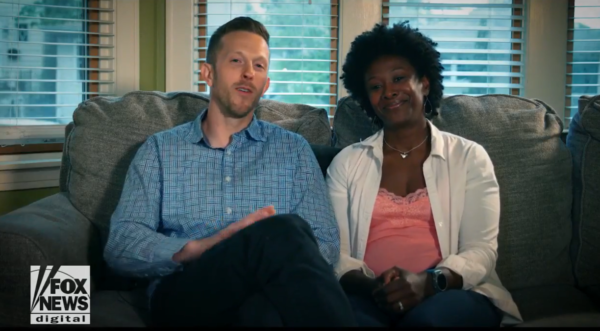‘Are Our Kids Half-Oppressor, Half-Victim?’: Interracial Couple Condemn Critical Face Theory at Suburban Chicago School District
An interracial couple from a Chicago suburb told Fox News they oppose controversial critical race theory teachings because it hurts people of color by victimizing them.
“What kind of inspiration are we expecting people to get from this, from critical race theory?” asked Takyrica Kokoszka, a Black woman and teacher at Chicago Public Schools. Kokoszka lives in the Chicago suburb of Oak Park, Illinois, with her white husband Martin, also a public school teacher, and their biracial children.
Oak Park Schools officials have introduced a set of social justice standards intended to act as anti-bias education for students in kindergarten on up, although the system does not identify the standards as based on critical race theory.
But according to Takyrica, who was born on Chicago’s West Side, critical race theory teachings are harmful for Black people.
“Are our kids half oppressor, half victims?” Martin, who hails from Connecticut, questioned. “How does that work?”
“And when they come home, who do they see?” Takyrica pressed. “Do they see their mom and their dad or do they see an oppressor and the oppressed?”
Takyrica said she’s disappointed that Oak Park, the community she’s felt embraced by, is now sending the message that her skin color prevents her from living at full capacity, adding that it’s been “bizarre” seeing how poorly people view Black people. Critical race theory puts an emphasis on whiteness, she said.
Critical race theory first originated in the 1960s and is an intellectual movement based on the idea that race is a social construct used to exploit people of color. It asserts that legal institutions in the United States are inherently racist and help maintain social, political and economic inequalities, particularly between whites and Blacks.
But Takyrica said the movement is being used to used to make excuses for why fewer Black students are performing on grade level in math and reading at her children’s school.
“Instead of us actually digging deep and looking into all the nuances that are involved with school achievement, we’ve watered it down, we’ve dumbed down to the reason is ‘it’s because the system is racist.’” She said the school where her children attend eliminated high-level math classes because there weren’t enough students of color enrolled, which eliminates the disparity but does not solve the problem.
Martin said critical race theory hurts Black students the most because “the message is you’re a victim, you could never make it until we tear down these systems and structures,” he said, adding that there were successful Black people during slavery and in the Jim Crow era. “All of a sudden, Black people cannot succeed?” he said.
Martin also expressed concerns over what the students would miss out on in the classroom while learning about critical race theory. With high expectations, Black students will “rise to the occasion,” he said, regardless of class or race.
When The 1619 Project was published in The New York Times, the controversy surrounding critical race theory intensified as some critics said the series amounted to a critical race theory interpretation of history. After schools across the country implemented the material into their curriculums, lawmakers in states like Iowa, Louisiana, Missouri, New Hampshire, Oklahoma, Rhode Island, West Virginia, and others pushed back by drafting bills that ban or restrict the lessons. Similar bills have already passed in Utah, Arkansas and Tennessee.
But Takyrica Kokoszka doesn’t seem to believe efforts in social justice will propel Black people forward. “Education is what got me where I am today,” she said. “It wasn’t activism.”

